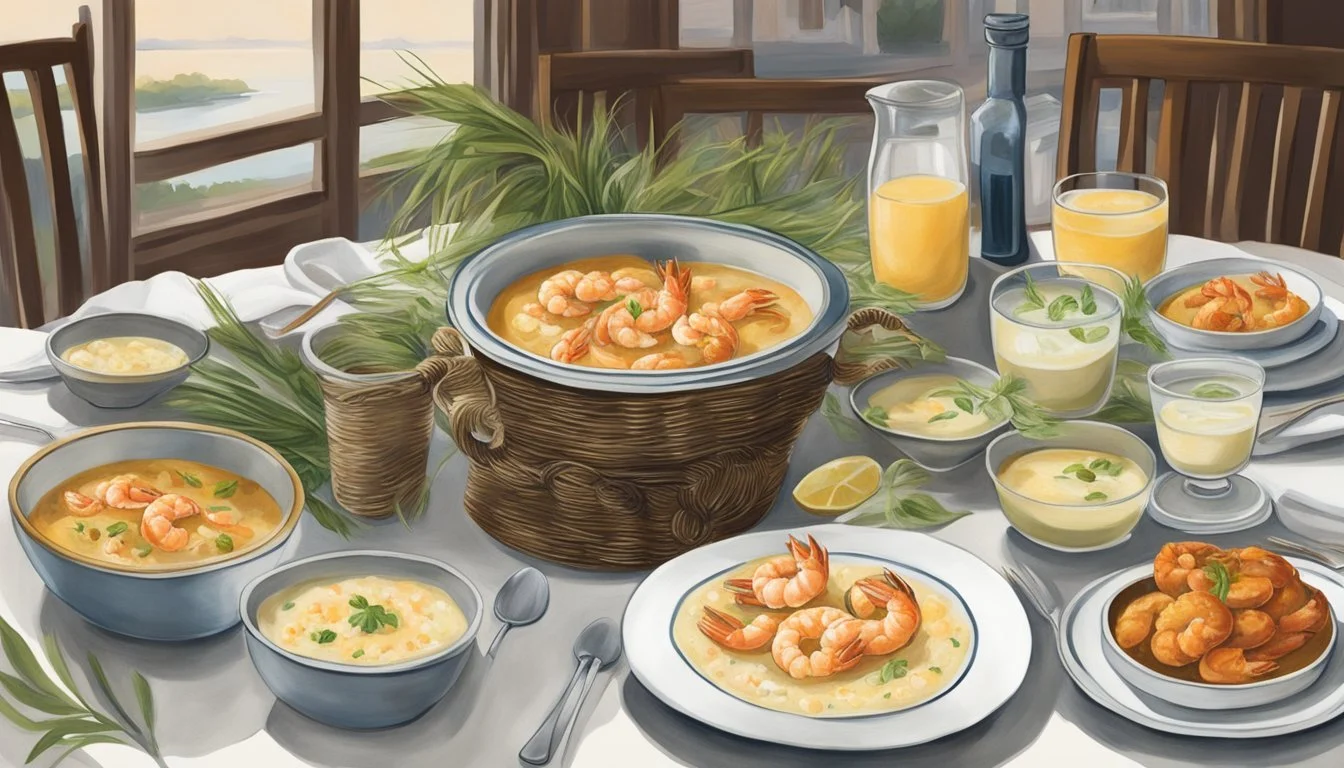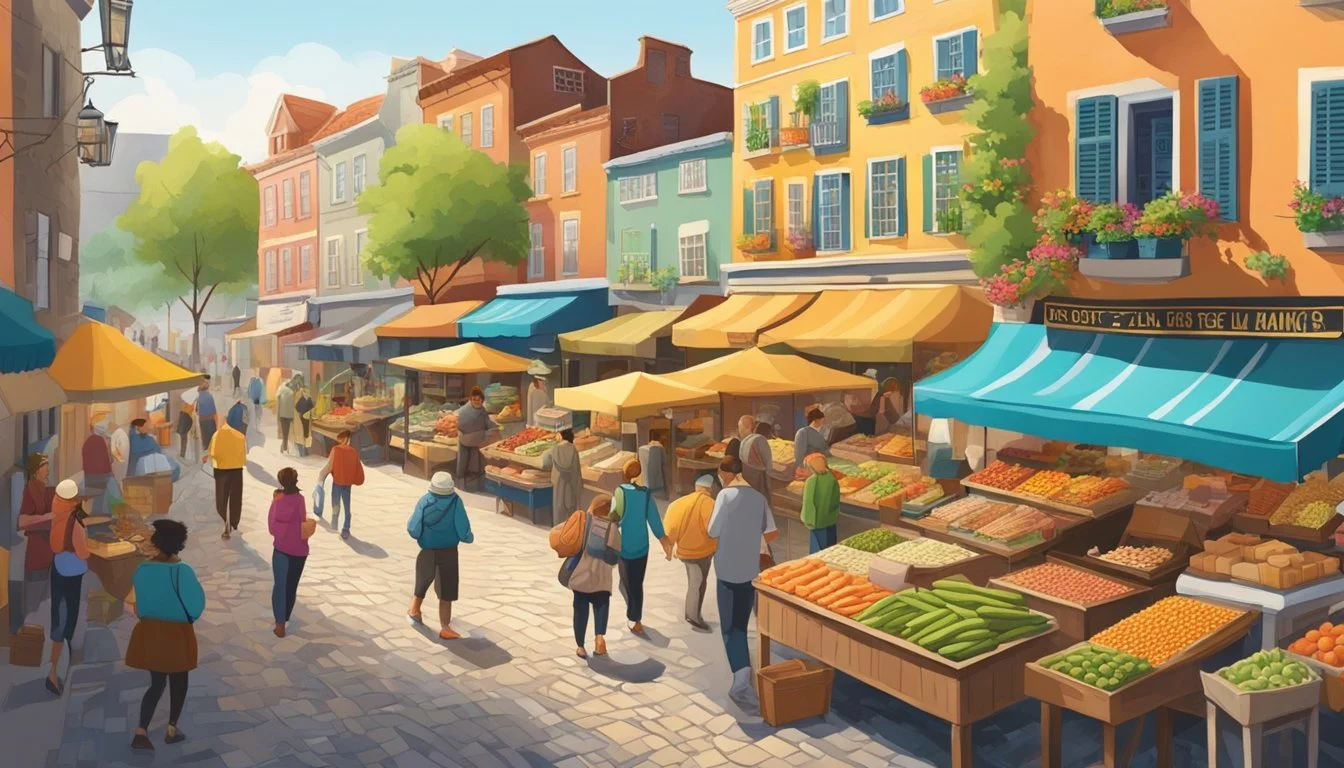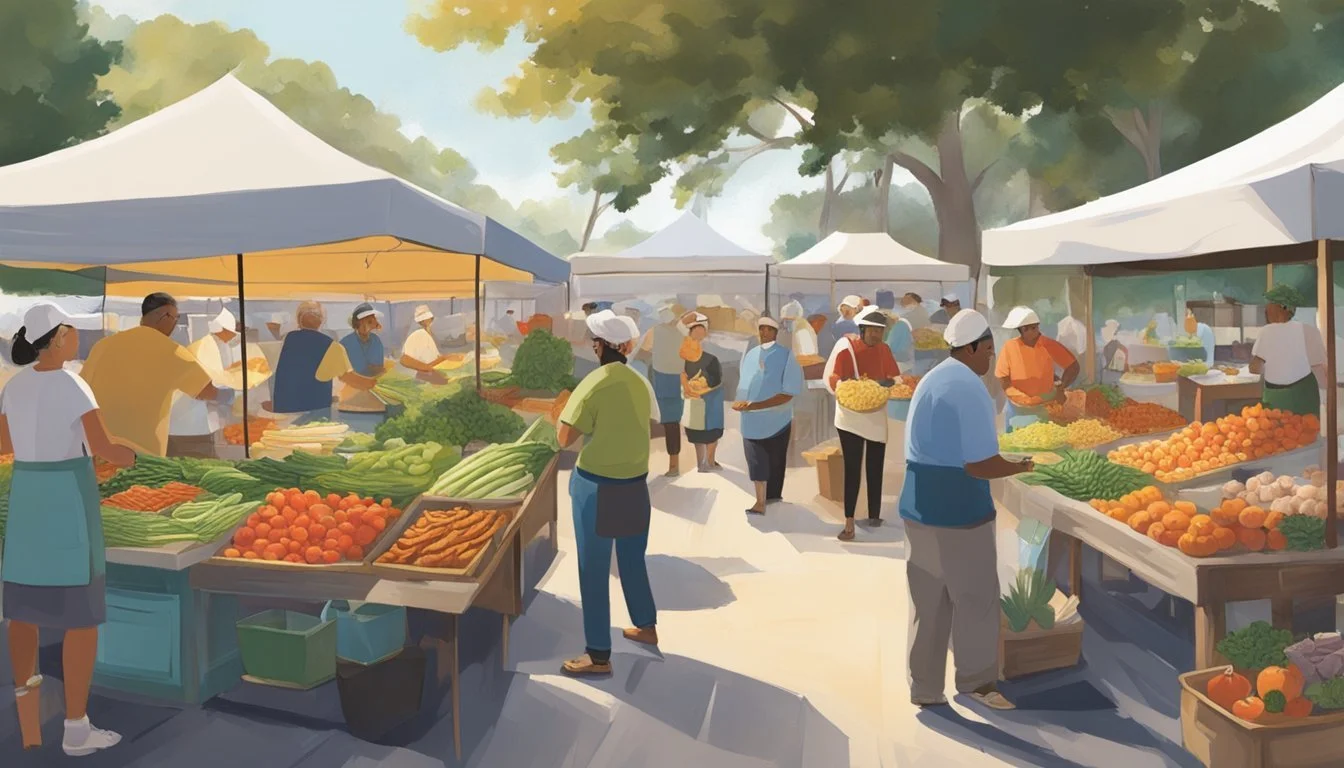Taste of Charleston
Exploring South Carolina's Culinary Delights
Charleston, South Carolina, is celebrated not just for its rich history and well-preserved architecture but also for its flourishing food scene. The city's culinary offerings are a tapestry of flavors that pay homage to its coastal location, agricultural heritage, and diverse cultural influences. Charleston's cuisine is quintessentially known as Lowcountry food, renowned for its utilization of fresh, local ingredients such as seafood (What wine goes well with seafood?), rice, and seasonal produce, which together create a unique and savory dining experience.
The Taste of Charleston captures the essence of this vibrant food culture. This annual event showcases the area's culinary artistry, featuring the finest restaurants and chefs who come together to offer a sampling of dishes that define the city's gastronomic landscape. From traditional Southern fare to innovative creations, attendees can explore an array of tastes that prove why Charleston has emerged as a foodie destination.
Food festivals like the Charleston Food Festivals and the Taste of Charleston provide not only the opportunity to enjoy sumptuous bites but also to experience the city's hospitable spirit and culinary ingenuity. With each event, Charleston continues to cement its reputation as a place where every meal is a celebration of local cuisine and community.
History of Charleston's Cuisine
Charleston's cuisine is a tapestry woven with influences from West Africa, Europe, and the Native Americans, but is most profoundly impacted by the culinary traditions of enslaved Africans and the Gullah Geechee people.
Influence of Enslaved Africans
The contribution of enslaved Africans to Charleston's culinary identity cannot be overstated. They brought crucial agricultural expertise, particularly in rice cultivation, a staple that became the heart of Lowcountry cuisine. The knowledge enslaved Africans carried from their homeland was vital in establishing the rice plantations that would define South Carolina's economy and its food culture.
Gullah Geechee Culinary Roots
The Gullah Geechee people, descendants of enslaved Africans from the rice-growing regions of West Africa, have fiercely preserved their unique culinary traditions. Dishes rich in the earthy flavors of okra, sweet potatoes, and fresh seafood are cornerstones of their food, with recipes passed down orally over generations, retaining the essence of the Gullah Geechee heritage.
Development of Lowcountry Cuisine
Lowcountry cuisine evolved through the fusion of ingredients and methods from different cultures. It is characterized by its reliance on locally sourced produce like rice, seafood, and greens. Seasonal and geographical availability shaped the cuisine, leading to a diverse culinary scene that's continually adapting yet deeply rooted in its historical underpinnings.
Iconic Charleston Dishes
In Charleston, SC, certain dishes have come to define the culinary scene, each rooted in local tradition and reflecting the rich cultural heritage of the area. The selection ranges from savory seafood staples to heartwarming comfort foods, all the way to indulgent desserts and sweets that are bound to satisfy any palate.
Seafood Staples
Charleston's proximity to the water means that seafood holds a special place in its cuisine. She-crab (What wine goes well with crab?) soup is a creamy classic, flavored with the roe of blue crabs and often a splash of sherry. For an authentic taste of this dish, you can visit notable establishments in Charleston. Equally iconic is shrimp (What wine goes well with shrimp?) and grits, once a humble breakfast dish, it has been elevated to a gourmet status, featuring succulent shrimp atop creamy, stone-ground grits.
Oysters (What wine goes well with oysters?): Enjoyed roasted, fried, or on the half-shell, Charleston oysters are a must-try for any seafood aficionado.
Fried Green Tomatoes: Though not strictly seafood, this dish is often served with a remoulade that complements local fish.
Classic Comfort Foods
The soul of Charleston can be found in its comfort foods. Staple carbohydrates like grits and red rice form the foundation of the Lowcountry's comfort food palette. Grits, especially, are a versatile element, appearing at meals from dawn till dusk, and embraced for their ability to complement both sweet and savory flavors. Collard greens (how long do collard greens last?) often accompany dishes like bbq, providing a tangy counterpoint to the rich, smoky meats. Traditional okra soup, a less commonly known but deeply rooted Gullah dish, combines stewed okra with tomatoes and meat for a hearty, flavorful meal.
BBQ: Slow-cooked and smothered in a variety of sauces, from mustard-based to vinegar-pepper, it reflects the region's diverse BBQ heritage.
Desserts and Sweets
Sweet endings are an essential part of Charleston's dining experience. The legendary coconut cake, particularly the celebrated 12-layer version, is a decadent and moist cake that has gained national favor. Meanwhile, pecan pie, with its rich, syrupy filling and crunchy pecans, is a Southern classic that has become synonymous with Charleston hospitality.
Coconut Cake: A towering indulgence that combines fluffy cake with rich icing, often available at upscale dining spots in Charleston.
Pecan Pie: This nutty, caramelized treat can be found at many local eateries and is a staple at family gatherings and holiday tables.
Notable Charleston Restaurants
Charleston, South Carolina, is celebrated for its culinary scene, showcasing a rich tapestry of flavors. The city offers a plethora of dining options, from the historic downtown to the scenic Mount Pleasant area.
Downtown Delicacies
Husk: Nestled in the heart of downtown Charleston, Husk epitomizes Southern cuisine with a menu that pays homage to the region's rich bounty, ensuring every dish features locally-sourced ingredients.
Hominy Grill: This establishment is a bastion of traditional Southern cooking. Though Hominy Grill has closed, its legacy in Charleston's culinary scene endures as a touchstone of comfort food.
The Ordinary: Housed in a historic bank, The Ordinary serves a celebrated selection of seafood, oysters, and inventive dishes that reflect Charleston's coastal heritage.
Virginia’s on King: Offering a tribute to Southern cooking, Virginia's on King is known for its classic Charleston fare, served in an environment that feels like stepping back in time.
Mount Pleasant Eateries
The Wreck of the Richard & Charlene: Affectionately known as "The Wreck," this Mount Pleasant gem offers a no-frills seafood experience with a stunning view of Shem Creek.
The Daily: A modern hub of activity in Mount Pleasant, The Daily serves as both a coffee shop and a casual eatery, providing locals and visitors with fresh bakery items, thoughtful sandwiches, and craft coffee.
Food Events and Tours in Charleston
Charleston, South Carolina, celebrates its vibrant culinary scene with a plethora of food-related events and tours that showcase the city's rich gastronomic heritage. From annual celebrations featuring local delicacies to immersive tours that explore Charleston's food culture, visitors and residents alike have numerous opportunities to indulge in the flavors of the Lowcountry.
Annual Culinary Celebrations
Charleston's annual culinary celebrations are a testament to the city's love affair with food. Highlights include the Lowcountry Oyster Festival, which is a must for seafood enthusiasts, offering countless oysters to roast and enjoy. Additionally, the Taste of Black Charleston brings together chefs and food lovers to honor the influence of African American cuisine on Southern cooking.
Lowcountry Cajun Festival: Scheduled for April 13, 2024, this festival celebrates with Cajun and Creole foods, Zydeco music, and various family-friendly activities.
Charleston Wine + Food Festival: An annual event that invites visitors to wine tastings, gourmet workshops, and chef demos, magnifying Charleston's culinary prestige.
Culinary Tours and Experiences
Those seeking an in-depth exploration of Charleston's food landscape can opt for various culinary tours and experiences. These guided excursions typically entail visits to significant culinary spots like the Charleston City Market and tastings of local specialties.
Charleston Food Tours: Offer a range of tours with knowledgeable guides that take visitors around the city to sample Lowcountry cuisine and learn about the region’s culinary history.
Chef-Led Culinary Adventures: Expert chefs guide food lovers through markets and eateries, sharing insights into Charleston's culinary techniques and ingredients.
These events and tours not only cater to the taste buds but also delve into the historical context of Charleston's food scene, making them both enjoyable and educational experiences.
Charleston's Culinary Evolution
Charleston's culinary landscape has seen a transformative journey, marked by an embracing of modern techniques and an influx of diverse talent that has reshaped its culinary identity.
Modern Innovations
In recent years, Charleston has undergone a renaissance in culinary art, blending traditional Southern cooking with innovative approaches. Chefs in the city are increasingly utilizing local ingredients to push the boundaries of flavor and presentation, emphasizing a contemporary twist on classic dishes. The result is a culinary scene that respects its culinary heritage while boldly moving forward. Examples of this evolution include farm-to-table establishments and experimental pop-up dinners that showcase the versatility and creativity prevalent in Charleston's food space.
Influence of New Chefs
The arrival of new chefs has been pivotal in Charleston's culinary evolution. These culinary experts have brought with them a variety of perspectives and experiences that enrich Charleston's dining offerings. They've respected the city's history while introducing new flavors and techniques, resulting in a vibrant and dynamic food scene. They are committed to honoring the culinary heritage of the region, while also making their own mark, often combining classical training with Southern ingredients to create unique and memorable dining experiences.
Local Ingredients and Flavors
Charleston, SC, prides itself on a rich culinary tradition that relies heavily on local ingredients and represents a blend of various cultures. Central to this tradition is the use of fresh seafood along with a diverse array of produce and spices, each contributing to the distinctive tastes of the Lowcountry cuisine.
Seafood
Charleston's proximity to the ocean provides a bountiful supply of seafood, which is a cornerstone of the local cuisine. Shrimp and crabs are particularly prevalent in dishes like the classic shrimp and grits or the savory she-crab soup. Grits, although not seafood, often accompany these marine delights, sourced from local mills and serving as a testament to the grain's enduring legacy in Southern cooking.
Shrimp and Grits: A beloved dish featuring sautéed shrimp over creamy, stone-ground grits.
She-crab Soup: A rich soup made from the delicate meat and roe of female crabs, seasoned to perfection.
For the freshest seafood selections, visitors might enjoy exploring manifold dining spots across the city, each offering its own take on these timeless classics.
Produce and Spices
In Charleston, Farm-to-table is not just a concept; it's a commitment to freshness and quality that shines through in every dish. Local produce like okra, tomatoes, and collard greens takes center stage in many traditional meals, enhanced by a unique blend of spices that transform simple ingredients into complex flavors.
Local Produce: Okra, tomatoes, collard greens, and more, often starring in the dishes reflecting Charleston's agrarian roots.
Signature Spices: Blends that often include garlic, paprika, and cayenne, pivotal in dishes like Charleston red rice.
With an array of seasoned farmers and crafty chefs, Charleston continues to deliver culinary experiences where the flavors do more than just tantalize the palate; they tell the story of the land and sea.
Exploring Charleston's Neighborhoods
Charleston is a city that boasts an array of diverse neighborhoods, each offering its own unique charm and experiences. From the historical allure of the French Quarter to the vibrant buzz of Upper King Street, visitors can immerse themselves in the distinct character of these areas.
French Quarter
The French Quarter is steeped in history, encapsulating Charleston’s past with cobbled streets and picturesque alleys. Visitors are drawn to the French Quarter for its art galleries and notable landmarks like the City Market. This historic market stretches four city blocks, featuring a variety of local artisans and producers. Those interested in the cultural tapestry of Charleston should not miss this district's art walks, showcasing local talent amidst the backdrop of heritage buildings.
Upper King Street Scene
Upper King Street, known for its dynamic energy, transforms from day to night with its spirited personality. By day, boutique shops and brunch spots cater to the casual passerby. As evening falls, Upper King Street gains momentum with an array of restaurants, bars, and music venues. It's the heartbeat of Charleston's contemporary culinary and nightlife scene, offering an ever-changing tableau of tastes and entertainment.
Culinary Education and Appreciation
Charleston, South Carolina, boasts an immersive environment for culinary education and appreciation. The city offers established culinary institutes and food-centric festivals that cater to those eager to enhance their understanding of culinary art and culture.
Culinary Institutes
Charleston's culinary institutes are pivotal in shaping the region's food identity, equipping aspiring chefs and enthusiasts with practical skills and theoretical knowledge. These institutions, such as the Culinary Institute of Charleston, provide comprehensive programs that emphasize classical techniques, innovative trends, and the essence of Southern cuisine. Students gain hands-on experience, preparing them for diverse careers in the culinary field.
Food and Culture Festivals
The city is also renowned for its food and culture festivals, where culinary art meets entertainment. One of the standout events is the Taste of Charleston festival, hosted annually at Boone Hall Plantation. The festival is a celebration of local cuisine, featuring:
Samplings: From Charleston's top chefs and restaurants
Live Entertainment: Ranging from music to chef demonstrations
Walking Tours: That blend culinary discovery with historical insights
These festivals not only entertain but also educate attendees on the regional flavors and food heritage, fostering a deeper appreciation for Charleston's culinary scene.
Guides to Charleston’s Food Scene
Charleston's food scene is a mosaic of flavors, steeped in Creole influences, Lowcountry cuisine, and traditional Southern fare. This guide focuses on the best places one can dine at and how to navigate the thriving culinary landscape of the city.
Best Places to Eat
When searching for the top dining experiences in Charleston, one cannot overlook spots featured in an Eater's guide to Charleston, where maps are curated to highlight the crème de la crème. The Lowland emerges as a standout for those seeking the heat of new trends. Meanwhile, Italian cuisine enthusiasts would delight in the handmade pasta of Trattoria Lucca, praised for its authenticity and atmosphere.
Charleston's commitment to Southern cooking is embodied in venues like Hannibal's Kitchen, a place that humbly treasures the heart and soul of Southern cuisine. It's not just the food; it's the genuine Charleston spirit that fills the room.
Navigating the Culinary Landscape
Understanding the Flavors:
Creole: A fusion of French, Spanish, West African, and Native American cuisine.
Lowcountry Cuisine: Coastal, comfort food characterized by rice, seafood, and rich gravies.
Southern Cuisine: Known for its comforting heartiness, including dishes like fried chicken and barbecue.
For food aficionados, strategically planning one's culinary journey is paramount. The JetsetChristina's foodie guide offers insights into where one can indulge in everything from fresh seafood to mouthwatering biscuits and barbecue.
For a casual yet eclectic dining experience, Charleston's food truck scene provides a tantalizing array of options, highlighted every Friday at Edmund’s Oast Brewing Co.'s Food Truck Fridays. This event is a perfect opportunity to sample a broad spectrum of dishes in a laid-back setting.
Restaurant guides not only highlight the cornerstones of Charleston's food scene but also direct gourmands to the hidden gems, ensuring a satisfying exploration of the city's rich culinary heritage.






